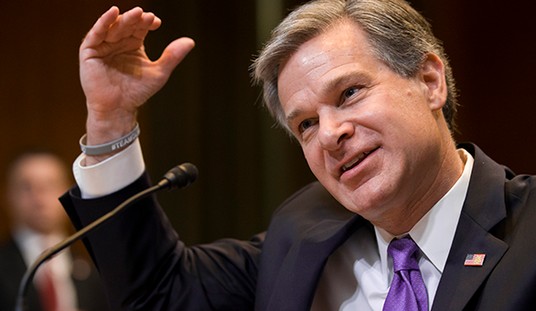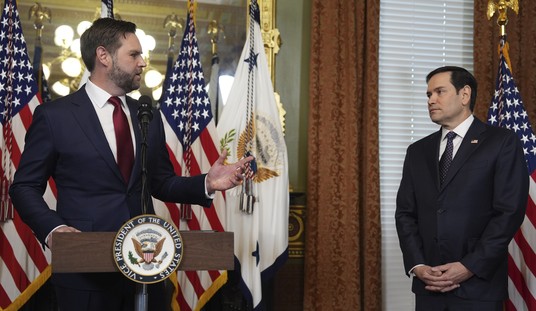John McCain gave a speech today on the critical nature of judicial appointments not just to the presidential election, but to the balance of power and the restraint of federal government. Speaking at Wake Forest University, McCain expounded on his own judicial philosophy, but also included the practical demonstration of his opponents’ philosophy as well. Chastising Barack Obama in particular, McCain pointed out that the supposed advocate of bipartisanship and New Politics showed none of his professed backbone when the Senate voted overwhelmingly to confirm John Roberts:
Here, too, Senators Obama and Clinton have very different ideas from my own. They are both lawyers themselves, and don’t seem to mind at all when fundamental questions of social policy are preemptively decided by judges instead of by the people and their elected representatives. Nor have they raised objections to the unfair treatment of judicial nominees.
For both Senator Obama and Senator Clinton, it turned out that not even John Roberts was quite good enough for them. Senator Obama in particular likes to talk up his background as a lecturer on law, and also as someone who can work across the aisle to get things done. But when Judge Roberts was nominated, it seemed to bring out more the lecturer in Senator Obama than it did the guy who can get things done. He went right along with the partisan crowd, and was among the 22 senators to vote against this highly qualified nominee. And just where did John Roberts fall short, by the Senator’s measure? Well, a justice of the court, as Senator Obama explained it — and I quote — should share “one’s deepest values, one’s core concerns, one’s broader perspectives on how the world works, and the depth and breadth of one’s empathy.”
These vague words attempt to justify judicial activism — come to think of it, they sound like an activist judge wrote them. And whatever they mean exactly, somehow Senator Obama’s standards proved too lofty a standard for a nominee who was brilliant, fair-minded, and learned in the law, a nominee of clear rectitude who had proved more than the equal of any lawyer on the Judiciary Committee, and who today is respected by all as the Chief Justice of the United States. Somehow, by Senator Obama’s standard, even Judge Roberts didn’t measure up. And neither did Justice Samuel Alito. Apparently, nobody quite fits the bill except for an elite group of activist judges, lawyers, and law professors who think they know wisdom when they see it — and they see it only in each other.
I have my own standards of judicial ability, experience, philosophy, and temperament. And Chief Justice Roberts and Justice Samuel Alito meet those standards in every respect. They would serve as the model for my own nominees if that responsibility falls to me. And yet when President Bill Clinton nominated Stephen Breyer and Ruth Bader Ginsberg to serve on the high court, I voted for their confirmation, as did all but a few of my fellow Republicans. Why? For the simple reason that the nominees were qualified, and it would have been petty, and partisan, and disingenuous to insist otherwise. Those nominees represented the considered judgment of the president of the United States. And under our Constitution, it is the president’s call to make.
How radical was Obama’s nay vote? His was one of only 22 votes in opposition to Roberts. Chris Dodd and Patty Murray voted to confirm Roberts, and yet Obama and Hillary Clinton voted against him. Getting to the left of Dodd and Murray takes some doing, and for a man who professes to be some kind of unifying force, the result proves him to be a hard-Left ideologue.
McCain has this much correct: we cannot restrain the federal government while the judiciary acts as a legislature. The very act of judicial activism of the kind supported by Obama, Clinton, and others puts more and more power into the federal government and away from the states and the people. No President or Congress could act to shrink the footprint of federal oversight while judges carve out more and more federal responsibility on their own without regard to the obvious meaning of the Tenth Amendment.
This activism reduces the freedom and liberty of all Americans, as McCain explains:
There is one great exception in our day, however, and that is the common and systematic abuse of our federal courts by the people we entrust with judicial power. For decades now, some federal judges have taken it upon themselves to pronounce and rule on matters that were never intended to be heard in courts or decided by judges. With a presumption that would have amazed the framers of our Constitution, and legal reasoning that would have mystified them, federal judges today issue rulings and opinions on policy questions that should be decided democratically. Assured of lifetime tenures, these judges show little regard for the authority of the president, the Congress, and the states. They display even less interest in the will of the people. And the only remedy available to any of us is to find, nominate, and confirm better judges. ….
In the shorthand of constitutional discourse, these abuses by the courts fall under the heading of “judicial activism.” But real activism in our country is democratic. Real activists seek to make their case democratically — to win hearts, minds, and majorities to their cause. Such people throughout our history have often shown great idealism and done great good. By contrast, activist lawyers and activist judges follow a different method. They want to be spared the inconvenience of campaigns, elections, legislative votes, and all of that. They don’t seek to win debates on the merits of their argument; they seek to shut down debates by order of the court. And even in courtrooms, they apply a double standard. Some federal judges operate by fiat, shrugging off generations of legal wisdom and precedent while expecting their own opinions to go unquestioned. Only their favorite precedents are to be considered “settled law,” and everything else is fair game.
The question, as Michelle notes, is which candidate can we trust to nominate better judges. Given the votes on Samuel Alito and especially on John Roberts, we can see a marked difference between the three candidates still left in the race. If we expect to end judicial activism, then we have to have a President willing to nominate justices in the mold of Roberts and Alito. We can’t even get Obama and Clinton to follow the majority of their Democratic colleagues to confirm such choices, let alone appoint them.
I know who I don’t trust appointing jurists to the federal bench.
Michelle has the whole speech posted in her extended entry.








Join the conversation as a VIP Member